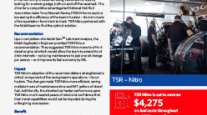Diesel Price Rises 2.7¢ to $2.652 in Fourth Consecutive Increase
This story appears in the Aug. 24 print edition of Transport Topics.
Diesel prices rose for a fourth straight week, gaining 2.7 cents to its highest price in nine months, $2.652 a gallon, the Department of Energy said Aug. 17.
The increase followed a 7.5-cent jump the previous week and brought trucking’s primary fuel 15.6 cents higher than a month ago, but still $1.555 below the corresponding week last year, not long after it set a record $4.764 in July 2008.
Gasoline, meanwhile, stemmed three weeks of increases by dropping a penny to $2.637 a gallon, DOE said following its weekly survey of filling stations.
Gasoline’s dip followed a 9-cent jump the previous week and left it $1.103 below the comparable week last year, following the record $4.114, also set in July 2008. Gas had gained 18.4 cents in the three weeks before its downturn last week.
Despite the diesel bump and the onset of the hurricane season, one analyst said last week that prices for both fuels were likely to roll back slightly over the next two months.
The diesel-versus-gas fluctuations happened because “diesel is more of a proxy for global economic expectations” than is gasoline, said Tom Kloza, chief analyst at the Oil Price Information Service.
Fuel traders “believed the world was beginning to generate some new [economic] growth, and growth kicks diesel demand up more than gasoline demand,” he told Transport Topics Aug. 18.
Prices for both fuels “are now in a mild retreat that could be the norm for the rest of the month,” Kloza said, adding, “Just when you think you are on the verge of $3 a gallon, people get reasonable and deduce that demand is just not there and supply is very comfortable.”
He said that even though the 2009 Atlantic hurricane season was moving toward its traditional early September peak, there was “plenty of crude [oil] and lots of additional refining capacity, should any tightness in supply due to storms or outages develop.”
The first named storms of the 2009 season formed last week — Bill is the first hurricane this year — though the National Hurricane Center predicted it would track well east of the U.S. mainland into the week of Aug. 24.
Oil closed above $72 a barrel on Aug. 19 for the first time since June 12, following a DOE report that showed crude inventories fell by 8.4 million barrels the previous week, contrary to analysts’ forecasts, Bloomberg News reported.
Gasoline inventories fell 2.2 million barrels, while distillates, which include diesel, declined 650,000 barrels, DOE said in its weekly report on fuel stockpiles.
Trucking companies, for their part, continued to struggle with fuel prices as they tried to remain profitable in a tight economy.
One executive said his fleet’s mileage was down slightly this year and speculated it was related to more biodiesel in his trucks’ fuel mix.
Gerald Krog, owner of Golden Ring Trucking Inc., Fergus Falls, Minn., said his 32-truck flatbed fleet’s mileage so far this year has fallen to about 6 mpg, from 6.2 mpg.
“I’m concerned because we lowered our [trucks’] speed to 65 mph from 67 mph, so I think [the lower mpg] has something to do with the fuel,” he told TT.
Golden Ring runs about 25% of its miles in Minnesota, which has a statewide 5% biodiesel requirement.
“Generally, we’re fairly open to the [fuel] market because we’re a small carrier and operate in 48 states and Canada,” he said, adding that his fleet includes a mix of model years and post-2002 and 2007 engines.
In addition to reducing the top speed of Golden Ring’s trucks, Krog said that to avoid excessive idling, his firm equips its fleet with BlueCool engine-off bunk cooler systems made by Webasto.
Meanwhile, one Texas auto hauler has been hedging some fuel purchases to lock in prices when they were down, a company official said.
“We were hedging earlier this year through Simons Petroleum, but right now, we don’t have a hedge in effect,” said Bill Wynn, operations manager and safety director for C.A.R. Transport Inc., Burleson, Texas.
The 100-truck carrier has not hedged in the past three to five months and has limited its drivers to buy fuel primarily at truck-stop chains, Love’s and Petro, to get fuel-card discounts.
Wynn said C.A.R.’s business was “pretty good,” as it runs automobiles for Honda and Nissan. He said the carrier operates primarily in the Midwest to as far west as Albuquerque, N.M.
“We try to get our drivers to buy most of their fuel in Texas and Oklahoma,” where it’s cheaper than farther north in the Midwest, he said.
DOE’s regional figures showed the Midwest average was $2.623 last week, while the Gulf Coast region was a few cents lower, at $2.607.




